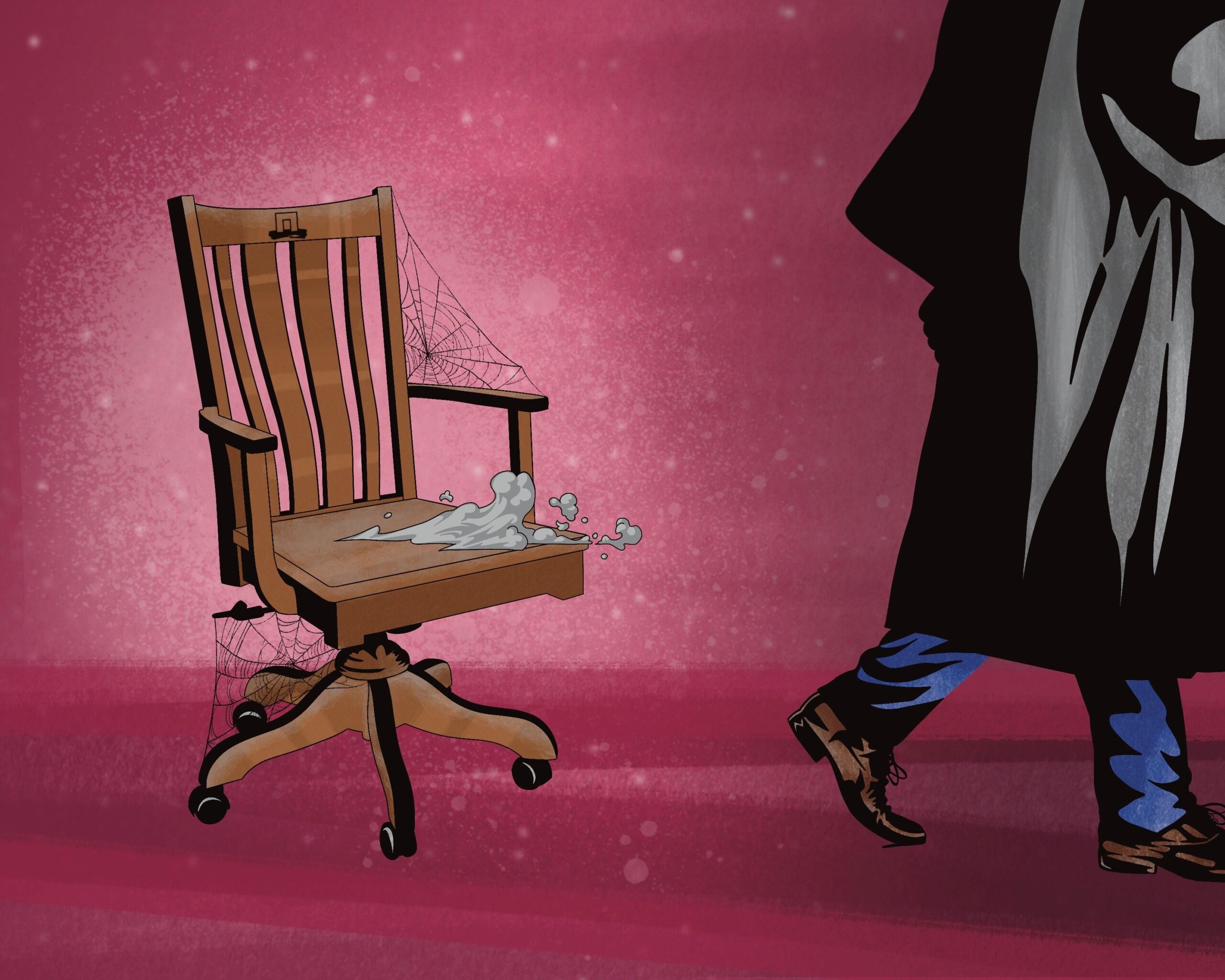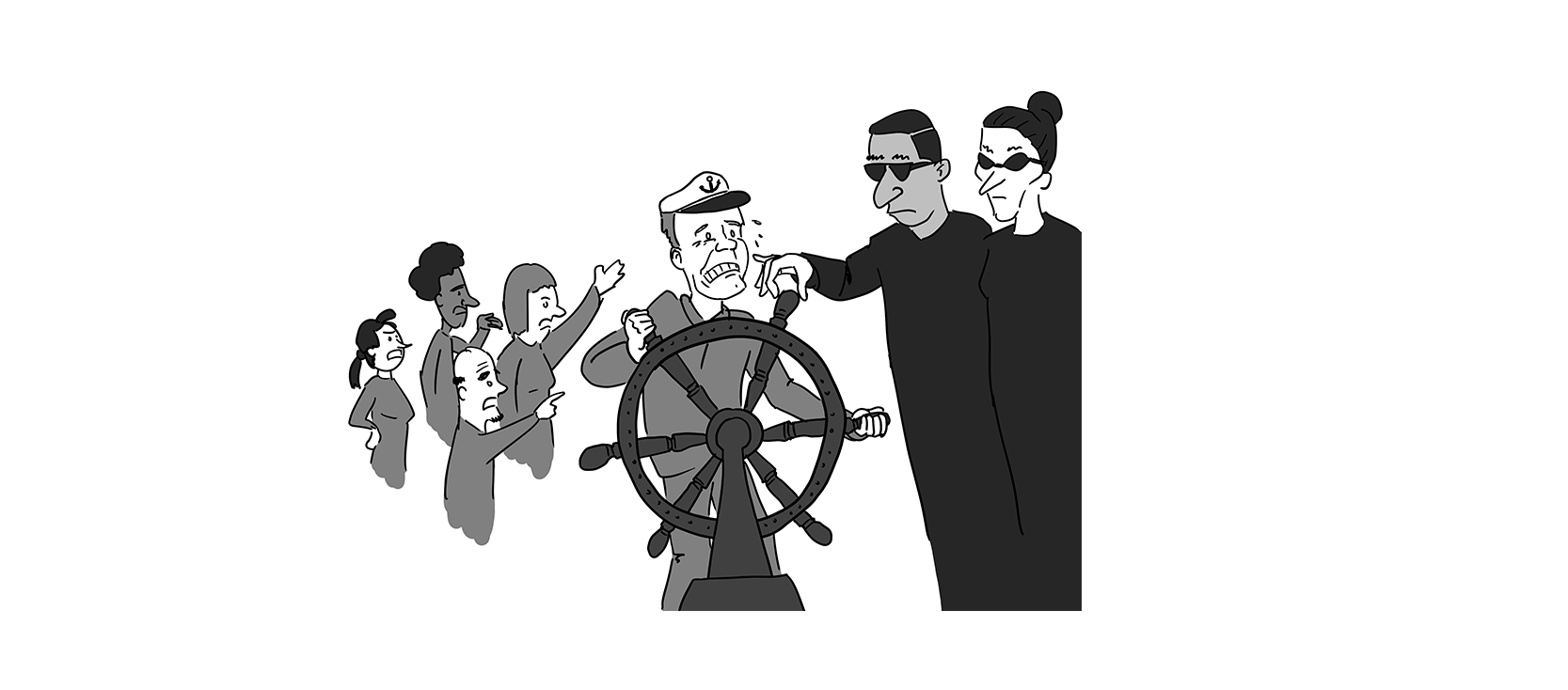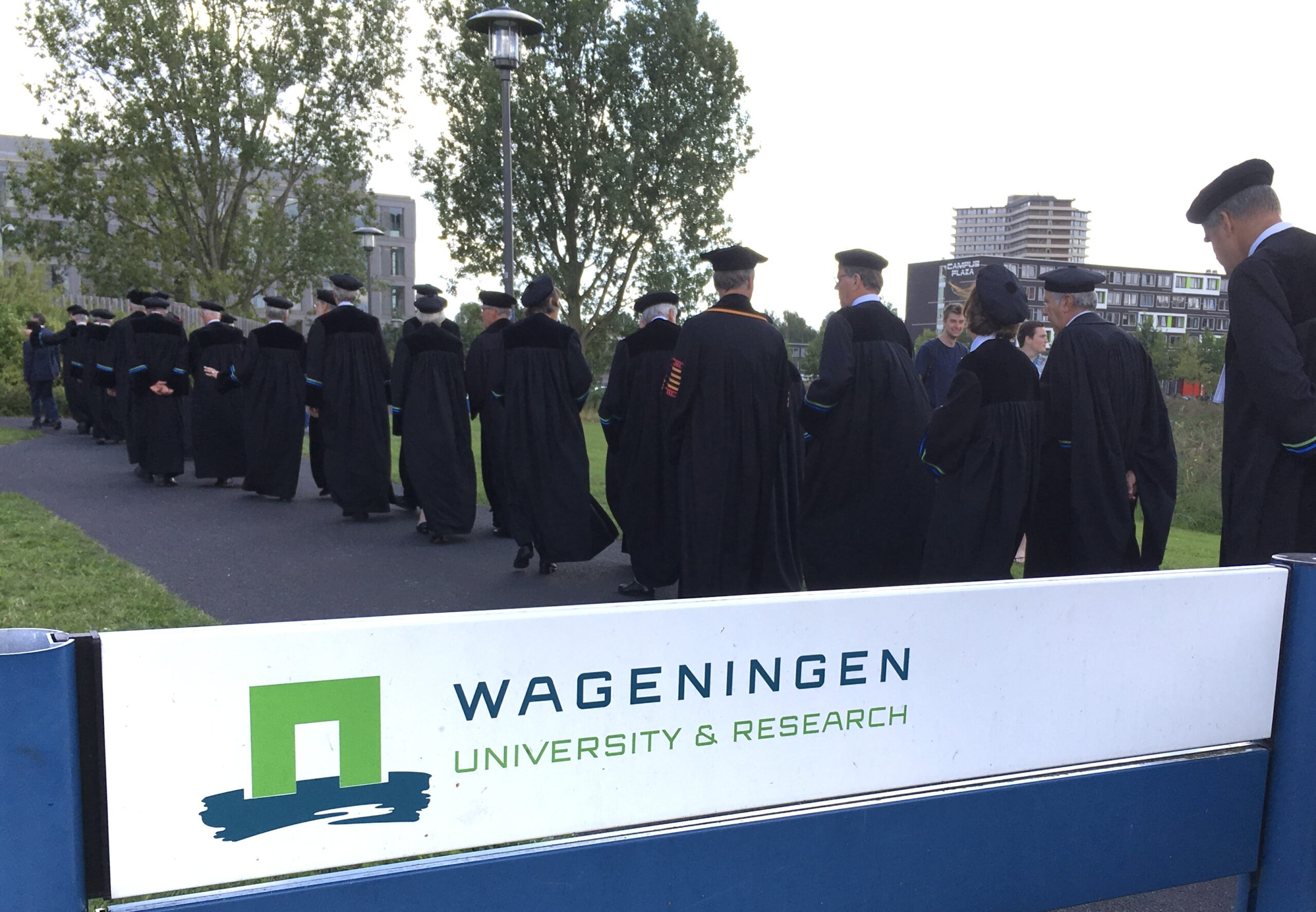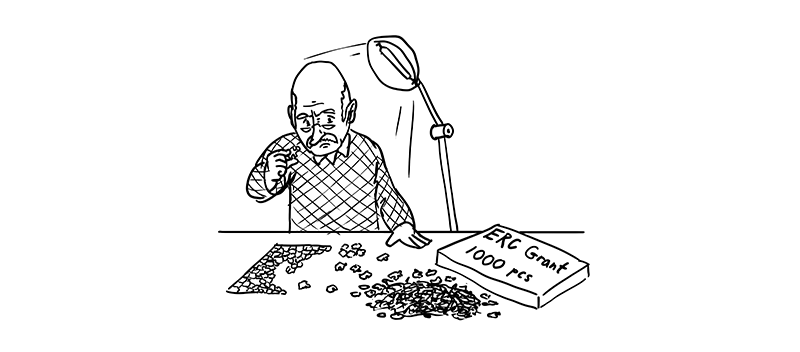The term of office of chairholders should be limited, as is standard practice for directors of science groups and board members at WUR. This suggestion was a parting shot from the outgoing ombudsperson Jacqueline Schoone in her last annual report. A good idea or a dubious plan?
Wageningen chairholding professors can end up staying in their posts for an extremely long time, Schoone noticed. She understands the reasons for this. ‘Unlike the way it works at many other universities, leading a chair group in Wageningen is a serious post, not a something you do a stint at. Academically, chairholders can really leave their mark on their group. The downside of that is that people are not keen to give up such an influential and prestigious job, even when there are actually good reasons to do so.’
Generally speaking, a move sideways feels like a move backwards to chairholders, suggests Schoone. ‘Demotion always has negative connotations.’ So they stay a long time – the majority of them, at least. As ombudsperson, she is critical of that clinging to power, especially by chairholders ‘whose use-by date has been reached’. Anyway, given the need for renewal and innovation in the groups, she thinks there should be a regular changing of the guard among chairholders. What do Wageningen chairholders, past and present, think about this themselves?
‘A sideways move creates mental space’
At his own initiative, Marten Scheffer handed over the chair of Aquatic Ecology and Water Quality Management to Bart Koelmans in 2018, and has since been concentrating once more on the practice of science, as an honorary ‘distinguished professor’.
‘Limiting the tenure like that strikes me as a good idea, mainly to reduce the risk of abuse of power. On the whole, all goes very well with chairholders. But occasionally it goes wrong and then it can be hard to get rid of a “tyrant”. And it certainly doesn’t happen without a lot of damage being done. I would think five years was a suitable period to lead a chair group, and if you ask me, the chairholder needn’t always be a full professor. Just rotate the position of coordinator, and then you will get a broader leadership team to share tasks and ideas on an ongoing basis. That is good for quality, flexibility and continuity.
‘I have never regretted asking Bart to take over the office of chairholder. In reality, we had already been doing it together for 20 years, with Bart as my “right-hand man”. We had shared ideals about how to facilitate a group in a way that makes everyone feel valued and able to complement each other. Socially and academically, the group turned into a lovely bubble, something we were tremendously proud of. We very carefully checked whether everyone in the group supported our handover, and took two years to do it. Bart was also reviewed by a committee for his “professorability”. It’s still going terrifically. It gives me a real peace of mind not to have that responsibility, and that leaves me with the freedom to delve even deeper into the science.’
‘A limited term of office can hold put people off making the move’
Bregje Wertheim has been chairholding professor at the Laboratory for Entomology since 1 September, when she succeeded Marcel Dicke who retires at the end of 2024. She came from the University of Groningen, where she established her own research group with a Rosalind Franklin Fellowship.
‘My first response is that a limited term of office feels like a crude instrument for something that needs tackling with more precision. If someone isn’t doing a good job, specific action should be taken. Another factor is that a limited term of office like that can put people off accepting the position of chairholder. After all, the time devoted to management and coaching as chairholder is inevitably spent at the expense of your research time. That has an impact on your chances of still competing successfully for a research-only job or for personal grants later.
‘I think a more promising option is to give chairholders the chance to pass on the chairholder baton to someone else while retaining their personal chair. That gives people the space to step aside if they or the chair group feel the need for that. That kind of approach can also facilitate a smooth handover to the new chairholder. Personally, I am currently in a handing-over phase with my predecessor, which I am benefitting from and enjoying.
‘Yes, in my case, a limited term of office might have put me off transferring to WUR. I had a very nice position as professor in Groningen, where I could effectively engage in both research and education. It wasn’t easy to give that up.’
‘Risk that personal preferences and bias predominate for a long time’
Rens Vliegenthart told Resource on a previous occasion that when he first moved from the University of Amsterdam to WUR, he didn’t mind whether he or personal professor Sanne Kruikemeier became head of the Strategic Communication chair group.
‘I think a chair group benefits from making the role of chairholder a rotating position. A term of four or five years, with the option of one more term and a certain amount of flexibility seems appropriate to me. And make sure as well that the typical tasks of the chairholder can more easily be delegated to group members – a kind of shared leadership. Examples would be HR-related issues, consultations at section and department levels, financial matters and hundreds of other things that currently land on the chairholder’s plate. This would give more people the chance to develop their leadership skills. There are certainly advantages to the Wageningen chair group system: groups have a lot of autonomy and as chairholder, you can keep the focus sharp.
‘At the same time, I think as it stands, the differences between chairholders and personal professors are too big. With their considerable formal decision-making powers, there’s a risk that the personal preferences and bias of the chairholder predominate for a long time in decisions that are crucial for the group. The chairholder can also be very dominant in decisions about the personal development of group members. In my view, the organization could do with being more egalitarian. I think you should form the chair group together, with an important role for personal professors and other group members with something to contribute.’
‘A pedestal isn’t always good for people’s character and behaviour’
At 62, Ellen Kampman is giving a lot of thought to the long-term prospects for her Nutrition & Disease chair group, and discusses this regularly with the group.
‘For me, the move to a chair was a conscious one. Not for the prestige, quite the opposite in fact. To me, being a personal professor is more of an ego-boost. I’m not so interested in being named as a co-author of articles, or obtaining personal grants. As chairholder, I play a coaching role and work in a broader field. What do we want to work towards as a group, and how can I ensure that everyone can grow?
‘Currently, you get appointed to the chair of a group for life. That can be a very long time. Actually, there should be a formal evaluation at least every five years, in which the group members give their evaluations (anonymously), possibly followed by a further term of office. For the big egos among the chairholders it would be good to hear now and then what people really think of you. Luckily, there aren’t many of them, but there are a couple of little dictators. If you put people on a pedestal, it isn’t always good for their character and behaviour.
‘Depending on the size and composition of the chair group, I would be happy with a kind of management team with a rotating chair. Maybe that would keep us all more on our toes. I’ve been in the post now for about 10 years. Of course I sometimes wonder whether I’m still doing a good job, or whether it’s time for a new broom. I talk about that openly with the group too. I don’t mind moving aside when the right time comes, although I’m not sure quite how I could then further my career. By now I’ve been out of my subject area for too long to become a personal professor. But there must be other worthwhile things to do.’
More clarity soon?
The suggestion that the tenure of chairholders should be limited is not new. It features, for instance, in the most recent Chair Plan that Resource could find (2019-2022). From the Executive Board we learn that a new Chair Plan is in the pipeline, and is currently awaiting input from the WUR Council. Spokesperson Vincent Koperdraat declines to say where the plan mentions the tenure of the chairholders. ‘It’s not good practice to say anything about that while the WUR Council is still looking at the plan.’
Judging by the previous Chair Plan, it seems likely the subject comes up in the latest one. The last one noted that chairholders, with their unlimited term of office, usually stay for a long time, and that long period ‘doesn’t necessarily meet the needs and wishes of the chairholders themselves or of the organization’. The paper outlines a number of alternatives, such as a five-year appointment or the option of enabling chairholders who step down to stay in their group as personal professors. But we also read, ‘These different scenarios beg the question of the attractiveness (of the position, ed.), the difference in pay between chairholders and personal professors, the allocation of responsibilities, and so on.’ The Chair Plan therefore announces that the period concerned (2019-2022) would be used ‘to study the options and come to a decision about the preferred model’.
Professorial chairs pretty much form the academic backbone of WUR. The Chair Plan plan, which is revised every few years, describes the academic brief for the professors. The plans are drawn up according to formal procedures: the Executive Board decides on them, based on recommendations from the rector magnificus.
Wageningen chair groups & full professors (as of 1 September 2024)
Chair groups 95
Chairholders 88 (and 7 vacancies)
Personal professors 89
Special professors 47
Distinguished professors 1
A chairholder is a full professor who bears the final responsibility for academic and organizational matters in a chair group. The appointment is currently still for life. Besides the chairholder, one or more personal professors may be attached to a chair group. These professors have their own research fields and teams, and their appointment is reviewed every five years.
Special professors are on temporary appointments (generally a maximum of five years and parttime: one day a week), funded by external parties. Finally, WUR has distinguished professors who are appointed for a maximum of seven years. This is an honorary title for excellent professors who have brought WUR a lot of prestige, projects, prizes and research funding. A particular stipulation is that WUR may only have five distinguished professors. Currently, Maarten Scheffer is the only one.
You can read more about Wageningen professors and policy related to them – and how you qualify to join their ranks – on WUR’s professors page.

 ‘Limiting the tenure like that strikes me as a good idea, mainly to reduce the risk of abuse of power.’ Illustration Valerie Geelen
‘Limiting the tenure like that strikes me as a good idea, mainly to reduce the risk of abuse of power.’ Illustration Valerie Geelen 

